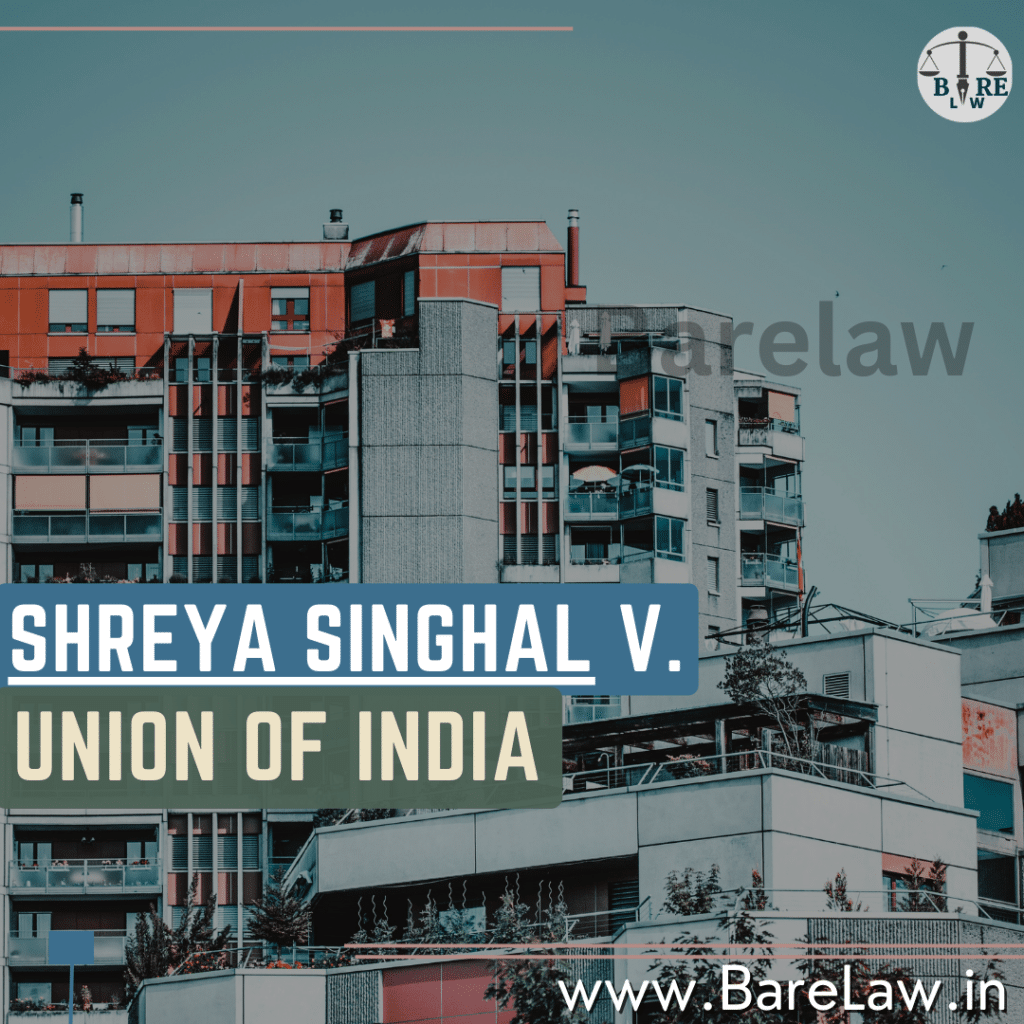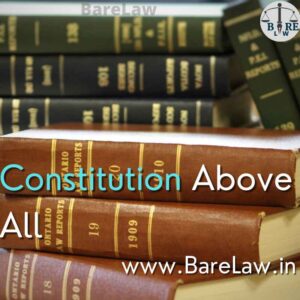Simplifying Your Life & Law | Legal Drafting services

Case brief on Shreya Singhal v. Union of India SCC Online SC 248
Introduction:
With the advent of technology, there come a lot of issues and challenges that accompany the same. It is important that the laws are not static in it, and they should make sure that whether these rules and regulations are in compliance with the ground norm or the supreme law of the land. If the same is not in compliance with the same, then the same shall be held unconstitutional by the protector of the Constitution – The judiciary. This is one of such important cases where the court dealt with the provisions of law and its validity. This work is to brief on the case of Shreya Singhal v. Union of India.
The Facts of the case:
The Fact of this case is that there were a number of writ petitions that were filed under article 32 of the Indian Constitution, which basically raised various important and far-reaching questions on the Information technology act, 2000. They all contended two main provisions on the ground that is in violation of article 19 and does not comply with the reasonable restrictions under Article 19(2) of the Indian Constitution. This particular section 66A was not originally available under the act before the 2009 amendment to the act of 2000. Along with the same, section 69A has also contended on the same ground. This court took all those petitions into one under this case and dealt the proceedings as follows.
Issues:
- Whether Section 66A of the Information Technology act of 2000 is in compliance with Article 19(1) (a) and reasonable restrictions under Article 19(2) of the Constitution or not?
- Whether section 66A violates and invokes arbitrariness, which is article 14 of the Constitution or not?
- Whether Section 69A violates the provisions of the Constitution or not?
Laws applicable:
- Article 19(1) (a) of the Indian Constitution
It states that all citizens shall have the right to freedom of speech and expression.
Article 19 (2):
“Nothing in sub-clause (a) of clause (1) shall affect the operation of any existing law, or prevent the State from making any law, in so far as such law imposes reasonable restrictions on the exercise of the right conferred by the said sub-clause in the interests of the sovereignty and integrity of India, the security of the State, friendly relations with foreign States, public order, decency or morality or concerning contempt of court, defamation or incitement to an offense.”
Arguments:
Learned counsel on behalf of the Petitioner contended that the said section that is section 66A, under the Information Technology act of 2000, portrays the rise of new crimes in the technological world. But, unlike sections 66B to 67C, this provision has not defined the terms included in its provision, and all crimes can be brought under the purview of former sections along with the Indian Penal Code. So, they contend the validity of this section on the ground of article 19(1) (a) – as it takes away the freedom of speech without reasonable grounds, and 19(2) by stating that the reasons mentioned under section 66A do not come under the reasonable restrictions as per Constitution. Thus, it should be held unconstitutional. They also contend on the ground of article 14, as this section gives discretionary powers to the government and can easily be used arbitrarily. As arbitrariness and discriminatory nature would render a provision void, section 66A is should also be struck down on these grounds.
On the other hand, Solicitor-general Tushar Mehta contended that just because a provision would discriminate or would lead to any arbitrary actions, the same shall not be said to be in violation of any provisions under the Indian Constitution.
The Decision of the court:
Firstly, with respect to the opinions on the internet, the court observed that information on the internet might contain different aspects, and this is not necessary that the same should be accepted by the majority who accepts or rejects it. It gave few examples to illustrate how an opinion that may not be attractive for the majority, that is; in that case, they oppose the same through their opposite opinions on the internet. It also happens vice versa. The court cleared that just because of this above Fact, and certain information cannot be termed as an annoyance, disturbance, etc., even though it affects few sections of society. In that way, section 66A brings everyone under its ambit, and any person who puts any information or opinion may also be punished under this section, which is a direct violation of article 19(1)(a) of the Constitution. The court stated that section 66A does not fall under any of the subject matter mentioned under article 19(2) – reasonable restrictions. Court noted that, if this is the case, it may promote the arbitrary exercise of the power with the government to suppress the freedom of citizens. Thus, section 66A has been held unconstitutional. In doing so, the court referred to the case of Romesh Thappar v. State of Madras, where the court rejected the contention of severability of a provision that was not in violation of Article 19(1)(a). But, unlike that case, here, that case was referred just to sever section 66A from the act of 2000. Thus, section 66A is severable from the act, and it is held unconstitutional.
Another issue that the court looked at was the contention on article 14. With respect to the same, the bench observed that they could not agree with the petitioners with respect to this contention on article 14. It stated that the internet does not, in any way, discriminate against any person and section 66A also brings everyone equally while punishing for the same. In other words, the internet allows many people to be part of it without any payment or anything. So, in order to put our opinion or any information on the internet, no one is restricted or discriminated against, at least not in this case under section 66A of the Information technology act, 2000. So, the section is not violative of Article 14 of the Indian Constitution.
Lastly, the bench held that section 79 of the Information technology rules of 2011 is valid, and the same is subject to 79(3). The Intermediary on receiving the notifications from the court or from the appropriate government should act accordingly, without any failure.
Conclusion:
Having seen the above case, it is clear that whenever there is a discretionary power on the government, then there will always be room for arbitrariness. It is the judiciary that has the duty, as in this case, to ensure the constitutional principles to protect the citizens and their rights accordingly.
You may also like to read:
-
06 Aug 2021
Case Briefs
Case Brief of Justice K.S.Puttaswamy (Retired). V. Union of India and Ors, 2017 (Right to Privacy – A Grandstand View)
-
05 Jul 2021
Opinion
Maratha Reservation: From Legislature of Precedent
-
16 Aug 2021
Know Your Law
The preamble to the Constitution of India
-
02 Oct 2021
Case Briefs
Case Brief on Rupa Ashok Hurra v. Ashok Hurra Writ petition (civil) 509 of 1997
-
09 Sep 2021
Know Your Law
CONCEPT OF LEGAL AID IN INDIA
-
12 Sep 2021
Know Your Law
Constitution above all







